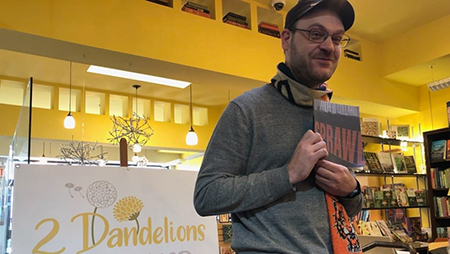- YouTube
- TikTok
Oakland alumnus says growing up in Metro Detroit helped inspire his award-winning poetry book

There was a time when Andrew Collard wasn’t sure if he would finish his degree at Oakland University. Fast forward several years later and he recently returned to Oakland as an alumnus to have a reading for his award-winning poetry book “Sprawl.”
“It was super fun,” Collard said of the reading at OU. “It was a fun mix of people. I had some family and friends that came out. Then there were some professors that I had when I was at OU. The professors were very encouraging to me while I was a student and showed a ton of patience with me at a time when I needed it because I had a lot going on outside of school. It was a fun homecoming.”
Collard earned a bachelor’s degree in English from Oakland before earning a master’s and Ph.D. from Western Michigan. He’s now a visiting professor of English at Grand Valley State University.
“Sprawl,” which won the Hollis Summers Prize from Ohio University Press, is a reconstruction of the constantly shifting landscape of metropolitan Detroit, which extends over six counties and is home to over four million people, from the perspective of a single parent raising a young child amid financial precarity.
Part memoir, part invention, the book is Collard’s attempt to reconcile the tenderness and sense of purpose found in the parent-child relationship with ongoing societal crises in the empire of the automobile.
“It's a book of poems that is very heavily set in Metro Detroit, and a lot of recognizable landscapes that people from the area know,” Collard said. "But it's very much a book about growing up and being a parent in the suburbs of Detroit. There’s a tribute to National Coney Island and one to The Telway, which is this little slider place at 11 Mile Road and John R.”
Oakland Associate Professor of English Katie Hartsock praised Collard’s writing and enjoyed seeing him return to OU for the reading.
“Collard's poetry is exquisite in its exploration of place and self, and in the lush craft of its lines,” Hartsock said. “We are incredibly proud to call him an alumnus of our program, especially since his poems contain so many odes and elegies from the worlds surrounding campus, in what one editor called, ‘A psychogeographical mapping of the greater Detroit area.’
“His work shows current students the ways they can create moving and meaningful writing out of the places and people they already know,” Hartsock added. “He's become an accomplished poet, editor and professor, and I'm excited to keep reading everything he writes.”
Collard said the book has got a lot of positive feedback, including at the reading at Oakland.
“I've been really interested to hear what people from the Metro Detroit area think of it. I don't think they often see themselves represented in poems,” Collard said. “I think there's this idea that poetry is this sort of academic pursuit, but that's not the world I come from. I think that’s what I've been enjoying more than anything else, people recognizing themselves in the poems and realizing that poetry is for them too.
"There’s a lot of economic hardship in the book because there's a lot of economic hardship in the area,” Collard added.
Collard dealt with his own hardships as an undergraduate at Oakland. He was forced to take a break from school more than once due to a variety of reasons, but he was able to finish his degree in part because of the encouragement from professors at Oakland.
“Part of the reason I came back to finish was having met English Professor Ed Hoeppner, who was really my gateway into the poetry world,” Collard said. “He really helped me out when I came back and was very aware that I had other stuff going on. Poetry was a like a refuge away from all the other stuff and a great experience for me.”
Collard said the professors at Oakland also inspired him to want to pursue a career in higher education.
“I had the chance this past semester to teach an evening class, which is of the sort of class that I often took as an undergrad, and we have a lot of working students and non-traditional students. That's where my heart is ultimately,” Collard said.
Collard said being at Oakland also helped him find people with similar interests.
“I was in a poetry workshop during my second run at Oakland and that's where I met several of my lifelong friends,” Collard said. “That ability to find community through poetry was really important. I’m really thankful for my time at Oakland and it was great to get a chance to come back.”


 July 2, 2024
July 2, 2024